As beloved Dalmatians reach their golden years, their human companions may notice the effects of aging on these spotty friends. Understanding that each Dalmatian ages distinctly — much like people — is vital for providing tailored care in their seniority.
Just like with us, age brings about a multitude of changes in dogs, from their energy levels and mobility to their dietary needs and health considerations.
It’s important for you to recognize these changes early and adjust your care routine to maintain a quality of life that keeps your dog as healthy and comfortable as possible.
With a breed known for its energy and distinctive coat, Dalmatians may face unique challenges as they become older.
Geriatric health in Dalmatians involves monitoring for breed-specific conditions, such as deafness or urinary stones, while also being vigilant about general senior dog concerns, such as arthritis or vision loss.
An appropriate balance of nutrition, exercise, and veterinary oversight is key to managing these senior years.
You can enrich their lives significantly by providing mental stimulation, love, and comfort to adapt to their evolving needs.
Key Takeaways
- Recognizing and adapting to your Dalmatian’s changing needs is critical for their well-being in older age.
- Balanced nutrition, exercise, and regular veterinary checks are essential for senior Dalmatian health.
- Providing mental stimulation and comfort supports the quality of life as your Dalmatian ages.
Understanding the Aging Process in Dalmatians

As your Dalmatian enters their senior years, being mindful of the changes they are undergoing can profoundly impact their quality of life. Awareness and care tailored to their evolving needs will ensure your aging companion continues to thrive.
Physical and Cognitive Changes
Your senior Dalmatian will experience both physical and cognitive changes.
As they age, you might notice a decrease in their energy levels and a potential increase in joint discomfort which can affect their mobility.
Managing their joint pain through vet-recommended treatments or adjustments in exercise can alleviate some of these issues.
Cognitive health is also significant, as your Dalmatian might face memory loss or confusion. To support their mental acuity:
Engage them in regular, gentle mental exercises such as:
- Puzzle toys; and
- Simple training games.
These practices keep their mind engaged and help maintain cognitive function.
Sensory Decline
Your aging dog’s senses will inevitably decline. This sensory decline can manifest as decreased vision or hearing, which may alter how they interact with their environment. Here’s what to watch for and how you can adapt:
- Vision: Look for hesitancy around stairs or in dim lighting, indicating potential vision loss.
- Hearing: A lack of response to verbal cues or commands might signal hearing difficulties.
Supporting your Dalmatian through these challenges involves:
- Keeping their living space consistent to avoid disorientation.
- Using hand signals to communicate if hearing loss becomes apparent.
- Consulting your veterinarian for ways to manage these sensory changes.
Health Concerns in Older Dalmatians
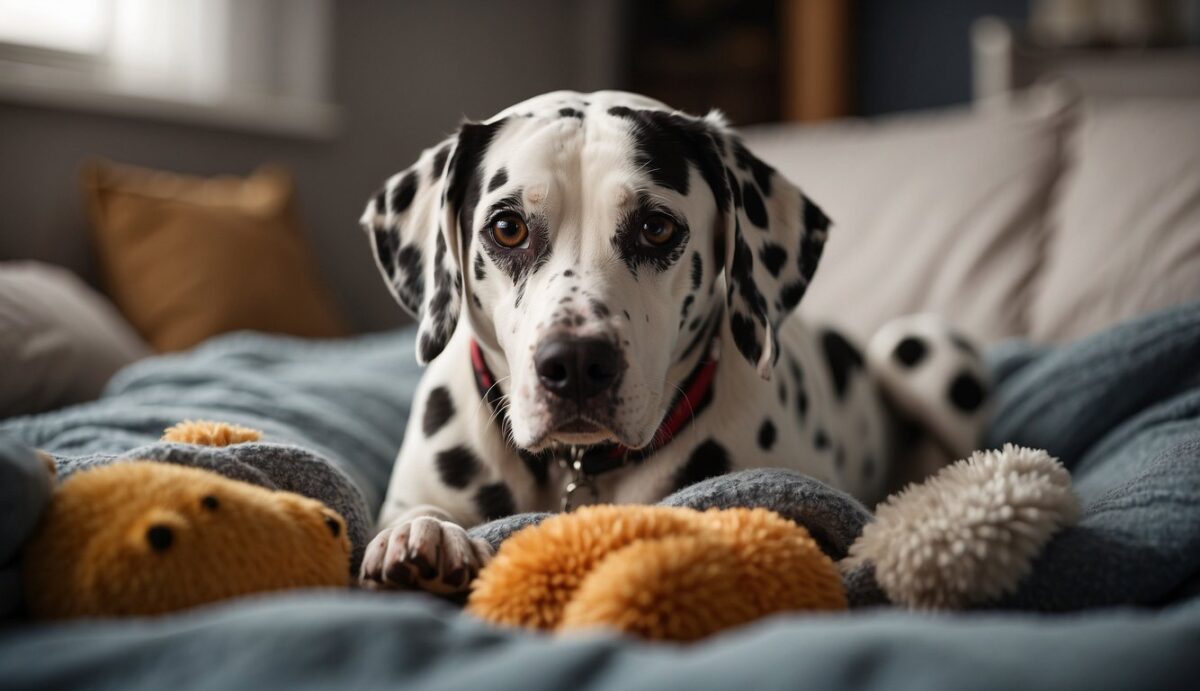
As your Dalmatian enters their senior years, you’ll want to pay special attention to their joint health and be vigilant about disease prevention. By recognizing and addressing these issues early, you can help maintain your furry friend’s quality of life.
Joint Health and Mobility Issues
As dogs age, the risk of joint-related conditions such as arthritis increases. This is due to the degeneration of cartilage and the development of chronic conditions that can lead to inflammation and pain in the joints.
Here are key points to consider for maintaining joint health and mobility in aging Dalmatians:
- Arthritis & Osteoarthritis: Affecting bones and joints, these cause inflammation, stiffness, and chronic pain, reducing movement and overall activity levels.
- Weight Management: Keeping your dog at a healthy weight reduces the stress on aging joints.
- Supplements: Glucosamine and chondroitin are commonly recommended to support joint health and cartilage repair.
- Regular, Gentle Exercise: Helps to maintain muscle mass and joint flexibility.
Disease Prevention and Early Detection
It’s crucial for your older Dalmatian’s health to prevent the onset of disease or detect it early:
- Cancer: Regular checks for lumps, sores, and unusual weight loss can help in the early detection of tumors and cancers.
- Kidney Disease & Diabetes: Watch for signs like increased thirst, weight loss, or appetite changes, which can be indicative of kidney issues or diabetes.
- Dental Disease & Periodontal Disease: Maintaining dental hygiene can prevent tooth loss and reduce the risk of organ damage from dental infections.
- Heart Disease & Cognitive Dysfunction: Changes in behavior or activity could signal heart disease or cognitive decline. Regular veterinary exams, including bloodwork, are essential to monitor these conditions.
- Vision and Hearing Loss: Be aware of changes in your dog’s ability to see or hear, as these can impact their safety and well-being.
Nutrition for the Senior Dalmatian
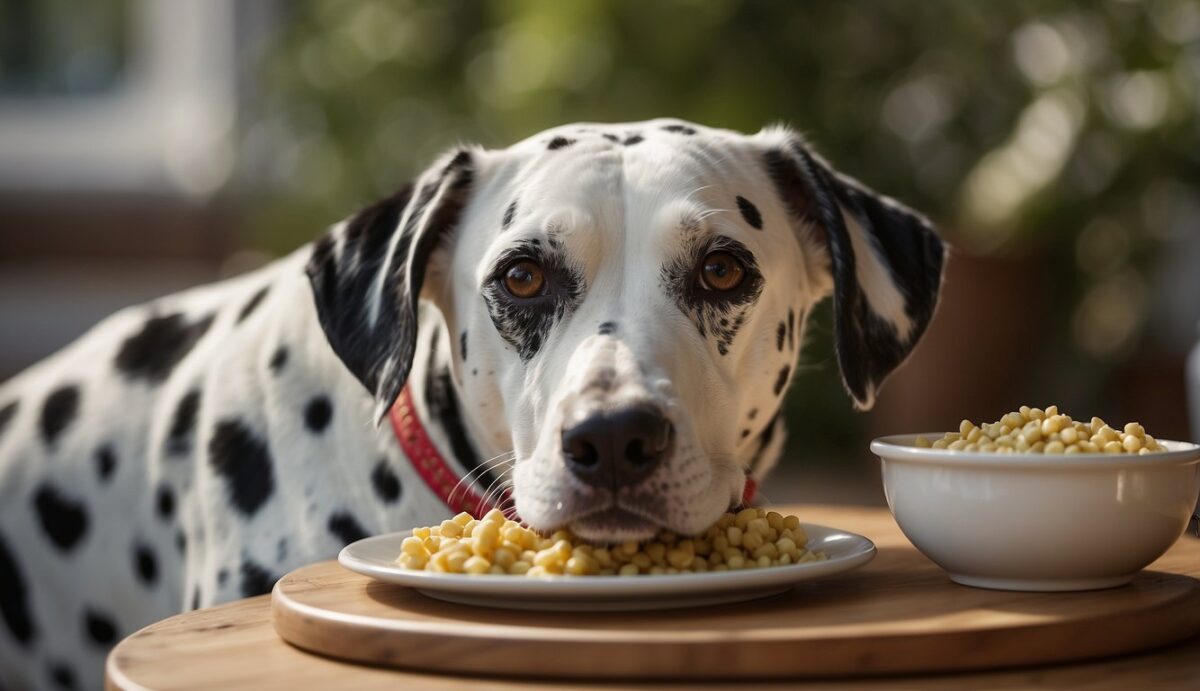
As your Dalmatian enters its senior years, its nutritional needs shift — attention to diet and supplements can support health and vitality.
Dietary Adjustments for Aging Dogs
Your senior Dalmatian’s metabolism slows with age, making them susceptible to weight gain and obesity. Therefore, it’s crucial to adjust their diet to maintain a healthy weight.
Senior dog foods often have fewer calories and lower fat content than regular adult dog food, but they’re formulated to provide all the necessary nutrients.
Here are key aspects to focus on:
- High-Quality Protein: Essential for maintaining muscle mass. Look for diets that contain meat as the first ingredient.
- Fiber: Aids in healthy digestion, which can be a concern for older dogs. The fiber content in senior dog foods helps prevent constipation.
- Reduced Calories and Fat: Prevents unnecessary weight gain.
- Omega-3 Fatty Acids: These are key for joint health and cognitive function.
When selecting a senior dog food, ensure it meets AAFCO (Association of American Feed Control Officials) guidelines, indicating it’s complete and balanced for your pet’s life stage.
Understanding Nutritional Supplements
Supplements can be a great addition to your senior Dalmatian’s diet. However, they should be chosen wisely and given in the right amounts.
- Joint Supplements: Glucosamine and chondroitin can support joint health. The appropriate daily dose would be about 400 mg of a joint supplement for a 10-kg Dalmatian, based on a standard dose of 40 mg/kg body weight.
- Omega-3 Fatty Acids: Besides being present in food, these can also be provided via supplements to enhance skin, coat, and joint health.
Always consult with your veterinarian before adding any supplements to your dog’s diet to ensure they’re necessary and given in the correct dosage.
Exercise and Weight Management
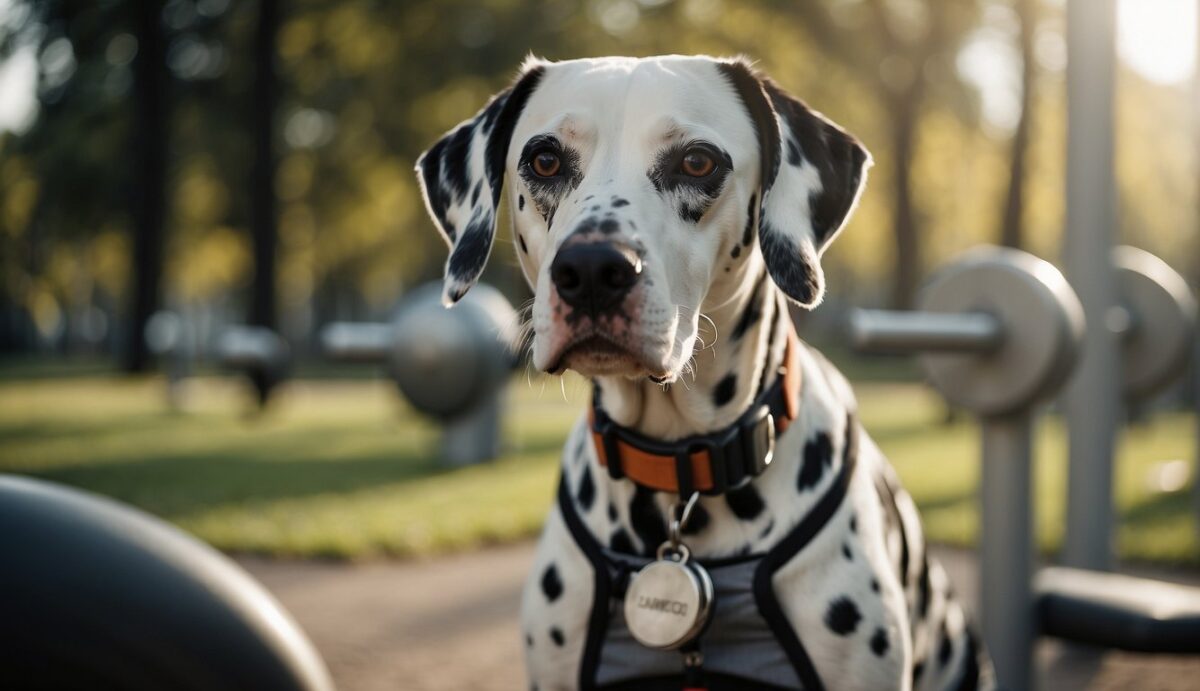
When it comes to your senior Dalmatian’s health, regular exercise and proper weight management play crucial roles in maintaining their vitality. As your dog ages, you’ll notice changes in their metabolism and activity levels – making it all the more important to adapt their care to suit their evolving needs.
Activity Levels and Types of Exercise
Your Dalmatian’s energy levels will likely decrease as they age. It’s essential to adjust their exercise routine to their changing capacity while ensuring they stay active to support joint health and mobility.
Here’s a simple guideline for structuring your senior Dalmatian’s exercise:
- Short, frequent walks: Aim for multiple brief walks each day to keep them moving without overexertion.
- Low-impact activities: Consider swimming or slow-paced fetching games to minimize stress on their bones and joints.
- Consistent routine: Stick to a regular exercise schedule to maintain their physical and mental health.
Remember to provide joint supplements if recommended by your vet, to support their bone and joint health while they exercise.
Maintaining an Ideal Body Condition
Managing your senior Dalmatian’s weight is pivotal for their overall health. An ideal body condition helps prevent obesity, which can lead to additional strain on their joints and complicate existing health issues. Here are tips on achieving this balance:
- Monitor food intake: Tailor their diet to their lower energy needs, preventing weight gain due to a slower metabolism.
- Healthy diet: Incorporate specially formulated senior dog food that provides balanced nutrition.
- Regular weigh-ins: Keep track of their weight with monthly check-ups at home or at the vet.
Veterinary Care for Senior Dalmatians
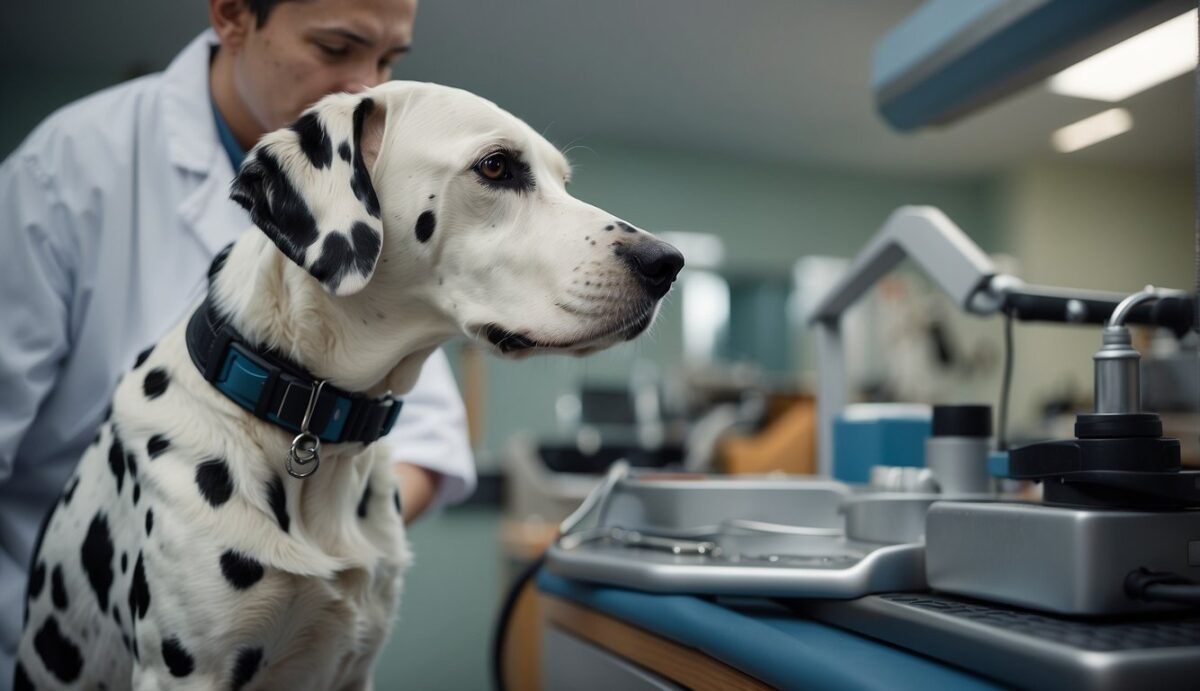
As your Dalmatian enters its senior years, regular veterinary check-ups and management of chronic conditions become vital to ensuring a high quality of life. Focus on routine visits and preventative strategies can help in early detection and treatment of age-related diseases.
Routine Visits and Preventative Strategies
Your senior Dalmatian should have routine veterinary exams at least once a year, if not every six months. These visits are key to preventative healthcare and can assist in catching issues early.
Here’s what you can expect:
- Physical Exam: Your veterinarian will perform a thorough physical exam to check for any signs of pain, discomfort, or the development of medical conditions commonly seen in older dogs, such as joint issues or dental disease.
- Senior-Specific Tests: Bloodwork, urinalysis, and other diagnostic tests are crucial in detecting early signs of kidney issues, diabetes, or other internal organ conditions.
- Vaccinations and Parasite Control: Keeping up with vaccinations and regular parasite control is important, as senior dogs can have weakened immune systems.
Managing Chronic Conditions
Staying on top of chronic conditions is necessary to maintain your Dalmatian’s health.
- Arthritis and Osteoarthritis: Look out for signs of arthritis, such as difficulty standing up or limping.
- Treatment can include pain relief medication, supplements, weight management, and specialized diets.
- Cognitive Dysfunction: Symptoms resembling dementia in humans can appear in senior dogs. Your vet may suggest medication and environmental management strategies to slow progression.
- Cancer and Heart Disease Screening: Regular screenings can detect diseases like cancer and heart problems early. Early detection and treatment can significantly affect prognosis.
- Dental Care: Good oral hygiene helps prevent dental disease, which can impact overall health. Professional cleanings and daily brushing are beneficial.
Behavioral and Mental Health
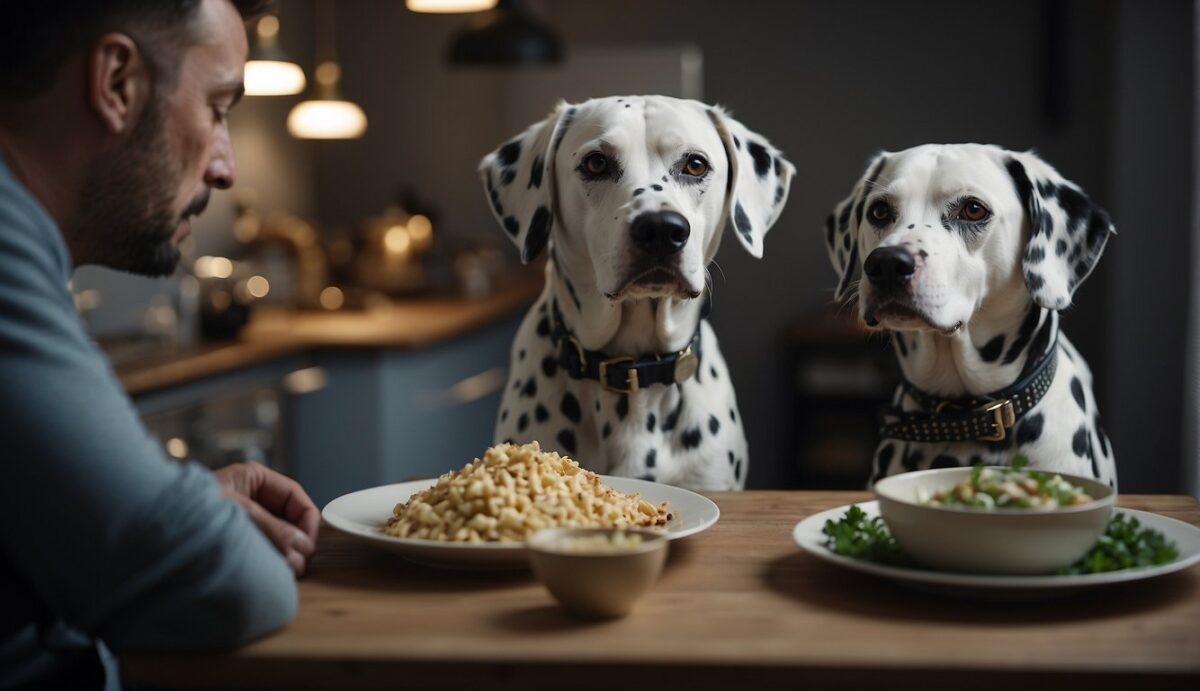
As your Dalmatian enters its senior years, you’ll likely notice changes in behavior that may be signs of cognitive decline. It’s essential to understand these alterations and how to promote mental health to maintain your dog’s quality of life.
Identifying Changes in Behavior
Be Alert to New Behaviors: Aging can affect your Dalmatian’s mental cognition, commonly leading to canine cognitive dysfunction (CCD). You might observe your dog appearing confused, having difficulty with commands they once knew, or even getting lost in familiar places.
Changes in sleep patterns, increased anxiety, and reduced interest in play are additional signs that your Dalmatian’s behavior is shifting.
Create a Comforting Environment: To minimize stress and anxiety, maintain a routine and establish a comfortable, safe space for your dog. The familiarity can be reassuring as they navigate the changes aging brings.
Enhancing Mental Stimulation and Well-being
Provide Enrichment Activities: Cognitive health in your senior dog can be maintained and enhanced through regular mental stimulation. Try activities like:
- Puzzle feeders for meals or treats
- Gentle new training exercises that can adapt to their physical abilities
- Regular, short walks in new environments to engage their senses
Balance is Key: Ensure that your Dalmatian is not overwhelmed.
Keep sessions short, fun, and full of praise to help bolster their confidence and cognitive abilities. Remember, the goal is to enrich their daily life without causing overstimulation or stress.
Pain Management and Comfort
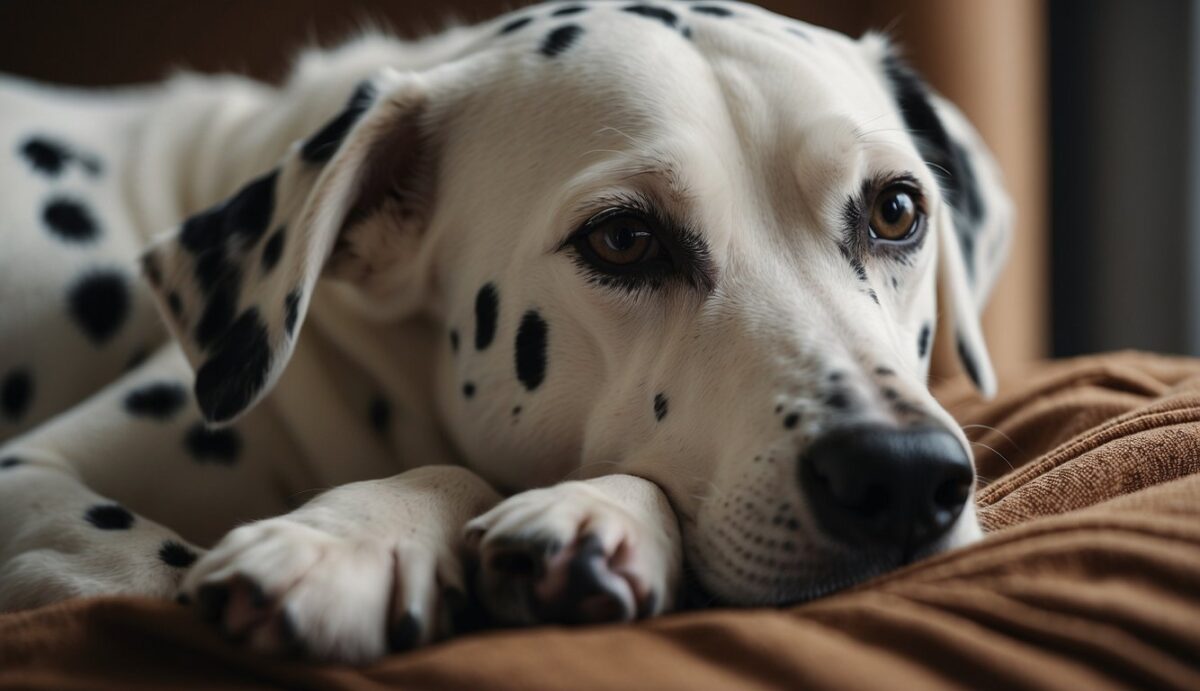
As your Dalmatian enters its senior years, managing pain and ensuring comfort become paramount for its quality of life. Health issues such as arthritis and cancer can lead to chronic pain and mobility issues.
Recognizing Signs of Pain
Your ability to recognize pain in your Dalmatian is crucial, as dogs often hide their discomfort.
Look for physical symptoms such as swelling or inflammation, which may manifest in their paws, legs, or face.
Changes in behavior, such as a decrease in mobility, can also signal pain.
It’s important to note any shifts in their normal behavior, including:
- Reluctance to climb stairs or jump
- Limping or favoring certain limbs
- Reduced activity levels or lethargy
- Vocalizing more than usual, such as whimpering or growling when touched
Therapies and Medications
Once pain is identified, various therapies and medications can be utilized to address your Dalmatian’s discomfort.
Pharmaceutical options may include non-steroidal anti-inflammatory drugs (NSAIDs) that target inflammation and provide relief from arthritis-associated pain.
Always consult with your veterinarian before starting any medication to ensure the safety and proper dosing for your dog.
For holistic and nonpharmacologic methods, consider the following:
- Supplements: Incorporating compounds like glucosamine and chondroitin can support joint health and potentially alleviate pain associated with arthritis.
- Massage Therapy: Gentle massage can improve circulation and reduce pain. It serves as a soothing way to provide comfort and strengthen your bond with your senior dog.
- Comfort Measures: Non-slip surfaces and padded bedding can improve your pet’s ability to move around safely and rest comfortably, reducing stress on joints.
Senior Dog Care and Lifestyle Adjustments

Caring for your aging Dalmatian involves creating a supportive home environment and maintaining a consistent grooming routine tailored to their changing needs. By making thoughtful adjustments, you can enhance your senior dog’s quality of life.
Home Environment Modifications
Your senior Dalmatian will benefit greatly from a home environment that caters to their comfort and safety.
As they age, dogs may experience reduced vision and hearing, making it important to maintain a consistent layout so they can navigate easily. Consider the following modifications:
- Ramps and Steps: Add ramps or steps to help your Dalmatian access furniture or vehicles if they have arthritis or joint issues.
- Non-slip Surfaces: Lay out non-slip rugs or yoga mats in areas where your dog might struggle with traction, this will help prevent falls and increase stability.
- Comfortable Bedding: Invest in an orthopedic dog bed to provide ample cushioning for their joints, keeping them comfortable while they rest.
Grooming and Daily Care
Regular grooming is crucial for your Dalmatian’s health and well-being, especially as they become seniors:
- Coat Care: Brush your Dalmatian’s coat frequently to prevent matting and to distribute natural oils, keeping their skin healthy.
- Nail Trimming: Keep their nails trimmed to a comfortable length to prevent issues with walking, which can aggravate joint pain.
- Ear and Eye Cleaning: Gently clean their ears and eyes to prevent infections and monitor any changes in hearing or vision.
- Dental Hygiene: Maintain dental hygiene with regular brushing or dental treats to prevent periodontal disease, common in older dogs.
Frequently Asked Questions (FAQs)
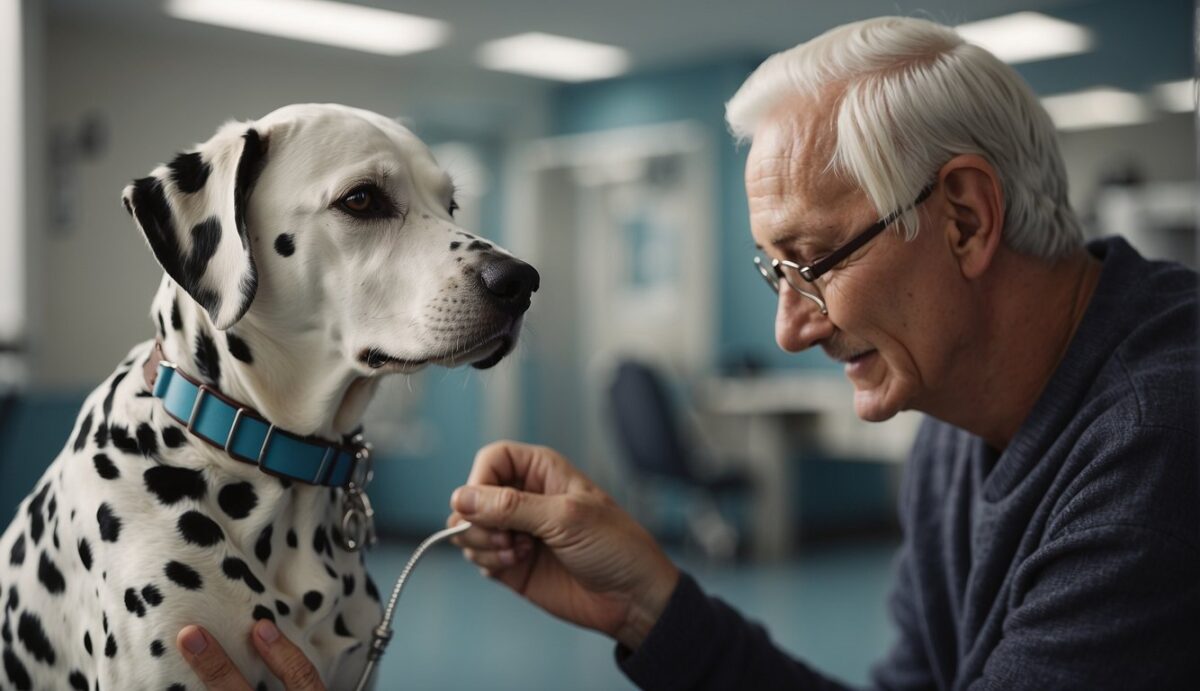
This section addresses some of the common inquiries regarding the health and care of senior Dalmatians to help you better understand and support your aging companion.
What common health problems do senior Dalmatians face?
Senior Dalmatians may encounter issues such as joint pain from arthritis, kidney stones, heart disease, and vision or hearing loss. They are also prone to obesity, which can lead to other health complications.
How can you tell if a senior Dalmatian is in good health?
Good health in senior Dalmatians is indicated by a healthy appetite, regular activity levels, clear eyes, good hearing, and a consistent body weight. Regular check-ups with your veterinarian will help monitor their health status.
At what age does a Dalmatian typically reach senior status?
Dalmatians are generally considered senior around the age of 7 to 10 years. The transition to senior status can depend on individual health and history.
What is a typical lifespan for male and female Dalmatians?
The typical lifespan for both male and female Dalmatians ranges from about 12 to 16 years, with proper care and attention to their health needs.
How do you care for an aging Dalmatian to ensure they remain comfortable?
Caring for an aging Dalmatian involves providing them a well-balanced diet suited to their age, maintaining a moderate exercise routine to keep their joints mobile, and ensuring a comfortable resting area. Regular veterinary check-ups are also crucial.
Are there specific signs of Cushing’s disease to look for in elderly Dalmatians?
Signs of Cushing’s disease in elderly Dalmatians include increased thirst and urination, a pot-bellied appearance, hair loss, and lack of energy.
If you notice these symptoms, it’s essential to consult your veterinarian.

